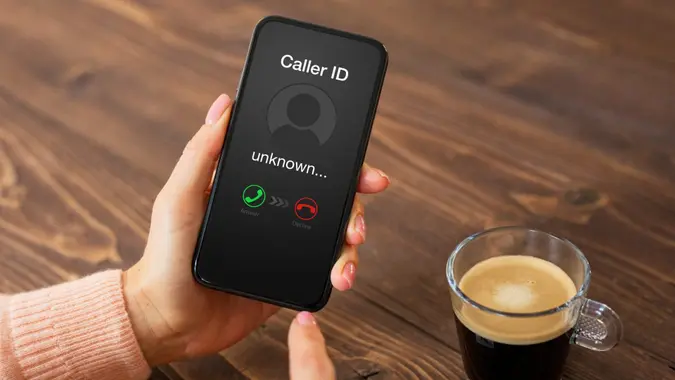4 Ways Phone Scams Steal Your Money — and How To Avoid Them

Commitment to Our Readers
GOBankingRates' editorial team is committed to bringing you unbiased reviews and information. We use data-driven methodologies to evaluate financial products and services - our reviews and ratings are not influenced by advertisers. You can read more about our editorial guidelines and our products and services review methodology.

20 Years
Helping You Live Richer

Reviewed
by Experts

Trusted by
Millions of Readers
Did you know 17% of Americans have experienced phone scams?
In August 2023, GOBankingRates polled 1,141 Americans to find out if they have ever experienced a financial scam. Seventeen percent of overall respondents said they had experienced phone scams. GOBankingRates also asked financial scam victims which type of scam they lost money to, and 43% said they lost money to a phone scam.
It can be difficult to recognize a phone scam as fraudsters can often cloud our judgment. Here are four common ways phone scams steal your money and what you can do to avoid them.
Imposter Scams
According to GOBankingRates’ survey data, 6% of Americans have experienced an imposter scam. The Federal Trade Commission (FTC) said some examples of imposter scams include receiving a call from a government agency or the IRS, someone claiming there’s a problem with your computer or someone pretending to be a family member or a love interest.
Scammers will use spoofing to make it look like someone you trust is calling you. This is the practice of making any name and number show up on your caller ID, including local area codes or an official name like the Social Security Administration.
Sweepstakes Scams
Even though only 2% of respondents surveyed by GOBankingRates said they experienced this scam, it’s quite common to get a phone call from a scammer saying you “won” a prize or contest. Scammers might also say you were selected as a winner and ask you to pay to receive the prize.
Phishing
Seven percent of overall Americans told GOBankingRates they have experienced a phishing scam. According to Synchrony Bank, phishing is when someone receives an email or text that seems legitimate. However, these emails or texts will ask you to share personal, or financial, information and express urgency in clicking links that can download malware on your devices.
Debt Relief
As millions of borrowers prepare to repay student loans in October and countless millions of Americans struggle with credit card debt, scammers are going into overdrive to fool Americans with debt relief scams.
The premise of this scam is simple enough: a scammer will forgive your student loans or lower credit card interest rates if you pay them money. Those who fall victim to a debt relief scam lose money from it. GOBankingRates’ survey results indicate nearly 3% of Americans have experienced a debt relief scam and 7% of victims have lost money to this scam.
How Do I Avoid Being a Victim of These Scams?
If you think you’re being targeted by a fraudster, here are a few helpful ways you can avoid these scams.
Report It
Those who have experienced a phone scam, have a number they want to report and did not lose any money are recommended by the FTC to report what happened at DoNotCall.gov. You can report unwanted calls, register your phone and verify your registration on this website.
Don’t Reply
Did you receive a text or an email from a phone number or address you don’t recognize asking for your payment information? Do not reply to it or click on any links.
Avoid Pressing Numbers
This tip is from the FTC about proper etiquette to maintain during a robocall. If you press any numbers during a robocall, you may end up receiving even more robocalls.
Hang Up
According to the FTC, federal agencies and law enforcement will never call you and threaten to arrest you, deport you or fine you. They will also never ask for your Social Security number or any other sensitive information over the phone.
If you’re receiving calls from fraudsters insisting you need to provide sensitive personal or financial information right away on the phone or else you’ll be arrested, say nothing and hang up.
 Written by
Written by  Edited by
Edited by 

























